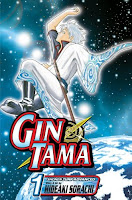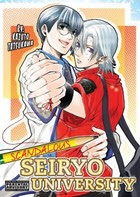My News and Reviews
I’m still being a slacker, so this section is going to be rather brief again. I promise to try to do a little better next week and find some interesting stuff for you all. Last week I showed a little love for Brigid Alverson’s MangaBlog as part of my Discovering Manga feature. I also posted a review of Issui Ogawa’s The Lord of the Sands of Time, one of Haikasoru’s debut titles from way back when (okay, 2009 really wasn’t that long ago…) I enjoyed it and look forward to reading more of Ogawa’s works.
The Cross Game Manga Moveable Feast is already off to a great start so keep an eye on the index page over at The Panelists as it gets updated. As for me, I have a quick look at the first third or so of the anime adaptation and later this week I’ll be posting a review of the first Cross Game volume published by Viz (equivalent to the first three collected volumes in Japan.)
Quick Takes
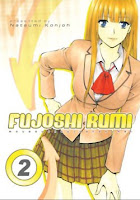 Fujoshi Rumi, Volumes 2-3 by Natsumi Konjoh. I really hope we get more volumes of this series because I’m enjoying it tremendously. Abe has fallen for Rumi and hard, but the poor guy just doesn’t get otaku. He’s willing to learn, but he doesn’t always get it right and so their developing relationship is bumpy. I can’t help but root for him, though. Rumi is just starting to figure out she likes him. Chiba is having a bit more luck in his own romantic pursuits, but not by much. Both he and Matsui are incredibly stubborn. There are a ton of translations notes included to help readers keep track of all the pop culture references made, but even if you don’t take time to read them all the series is still funny.
Fujoshi Rumi, Volumes 2-3 by Natsumi Konjoh. I really hope we get more volumes of this series because I’m enjoying it tremendously. Abe has fallen for Rumi and hard, but the poor guy just doesn’t get otaku. He’s willing to learn, but he doesn’t always get it right and so their developing relationship is bumpy. I can’t help but root for him, though. Rumi is just starting to figure out she likes him. Chiba is having a bit more luck in his own romantic pursuits, but not by much. Both he and Matsui are incredibly stubborn. There are a ton of translations notes included to help readers keep track of all the pop culture references made, but even if you don’t take time to read them all the series is still funny.
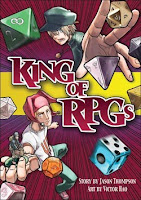 King of RPGs, Volume 1 written by Jason Thompson and illustrated by Victor Hao. The second volume of King of RPGs is set for release this week, so I figured it was a good time reread the first volume. As a gamer, I really love this series and find it hilarious. A lot of the humor depends on at least a passing knowledge of RPGs and various other types of gaming and nerd culture. There are plenty of in-jokes and references, too, so someone not familiar with gaming will probably be lost. All sorts of nerdiness is displayed in King of RPGs: MMORPGs, table top RPGs, fantasy football, boardgames, collectible card games, miniatures, otaku, live action role playing, cosplay, Renaissance festivals, and more. And some of the characters, really, really get into what they’re playing.
King of RPGs, Volume 1 written by Jason Thompson and illustrated by Victor Hao. The second volume of King of RPGs is set for release this week, so I figured it was a good time reread the first volume. As a gamer, I really love this series and find it hilarious. A lot of the humor depends on at least a passing knowledge of RPGs and various other types of gaming and nerd culture. There are plenty of in-jokes and references, too, so someone not familiar with gaming will probably be lost. All sorts of nerdiness is displayed in King of RPGs: MMORPGs, table top RPGs, fantasy football, boardgames, collectible card games, miniatures, otaku, live action role playing, cosplay, Renaissance festivals, and more. And some of the characters, really, really get into what they’re playing.
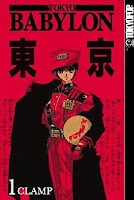 Tokyo Babylon, Volumes 1-7 by CLAMP. I know quite a few people who love Tokyo Babylon, but I must admit I wasn’t particularly impressed by the early volumes. However, I did like the final few as things turn really dark and become less episodic. The series it’s actually pretty depressing; Subaru is never as successful as he would like to be and is very sensitive to those around him. And then there’s Seishirō, who proves to be problematic for him for a number of reasons. I liked CLAMP’s artwork in this manga which uses a lot of black space. I never quite got Hokuto’s sense of fashion, but I did like some of the outfits. Subaru and Seishirō’s story is apparently continued as part of CLAMP’s X series, which I haven’t read yet.
Tokyo Babylon, Volumes 1-7 by CLAMP. I know quite a few people who love Tokyo Babylon, but I must admit I wasn’t particularly impressed by the early volumes. However, I did like the final few as things turn really dark and become less episodic. The series it’s actually pretty depressing; Subaru is never as successful as he would like to be and is very sensitive to those around him. And then there’s Seishirō, who proves to be problematic for him for a number of reasons. I liked CLAMP’s artwork in this manga which uses a lot of black space. I never quite got Hokuto’s sense of fashion, but I did like some of the outfits. Subaru and Seishirō’s story is apparently continued as part of CLAMP’s X series, which I haven’t read yet.
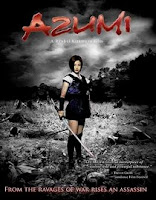 Azumi directed by Ryuhei Kitamura. Apparently the film is loosely based on Yū Koyama’s manga series Azumi, a fact I wasn’t aware of while watching the movie. Azumi is a member of group of orphans raised to be highly skilled assassians. Their mission is help secure the dominance of the Tokugawa clan by killing opposing leaders. However, the more Azumi becomes involved, the more she questions what they are doing. It’s an entertaining if somewhat mediocre film. The special effects are only okay and the choreography a bit awkward at times, although the huge battle towards the end of the film is pretty great. An interesting note on the language: Azumi speaks using a masculine form of Japanese.
Azumi directed by Ryuhei Kitamura. Apparently the film is loosely based on Yū Koyama’s manga series Azumi, a fact I wasn’t aware of while watching the movie. Azumi is a member of group of orphans raised to be highly skilled assassians. Their mission is help secure the dominance of the Tokugawa clan by killing opposing leaders. However, the more Azumi becomes involved, the more she questions what they are doing. It’s an entertaining if somewhat mediocre film. The special effects are only okay and the choreography a bit awkward at times, although the huge battle towards the end of the film is pretty great. An interesting note on the language: Azumi speaks using a masculine form of Japanese.
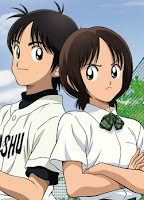 Cross Game, Episodes 1-16 directed by Osamu Sekita. I’m not a huge sports fan and so I wasn’t sure if I would like the Cross Game anime or not. But from reading the manga, I did know that I at least liked the characters. So far, I find the anime a little slow going for my own personal taste, but I still enjoyed watching it and will probably watch more. The slower pacing works for the manga, but doesn’t transfer over to the adaptation quite as well. Or maybe it’s just that I can read through the baseball games (which don’t really interest me) more quickly than I can watch them. The anime does change up some things from the original, keeping it interesting even if you have read the manga.
Cross Game, Episodes 1-16 directed by Osamu Sekita. I’m not a huge sports fan and so I wasn’t sure if I would like the Cross Game anime or not. But from reading the manga, I did know that I at least liked the characters. So far, I find the anime a little slow going for my own personal taste, but I still enjoyed watching it and will probably watch more. The slower pacing works for the manga, but doesn’t transfer over to the adaptation quite as well. Or maybe it’s just that I can read through the baseball games (which don’t really interest me) more quickly than I can watch them. The anime does change up some things from the original, keeping it interesting even if you have read the manga.



